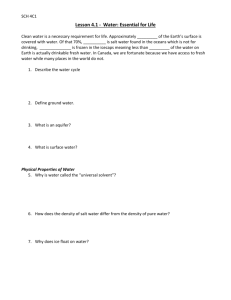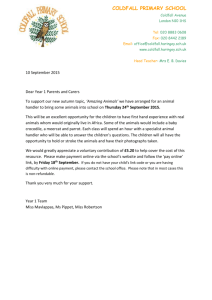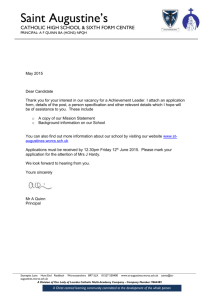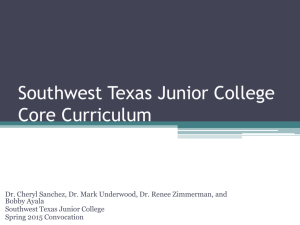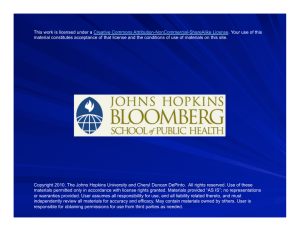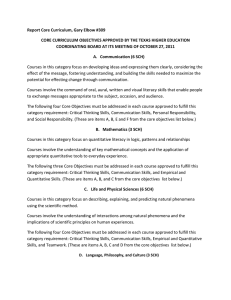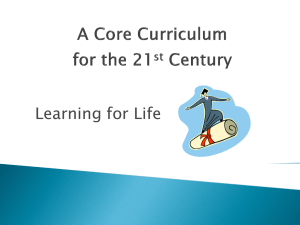Core Curriculum Revision
advertisement
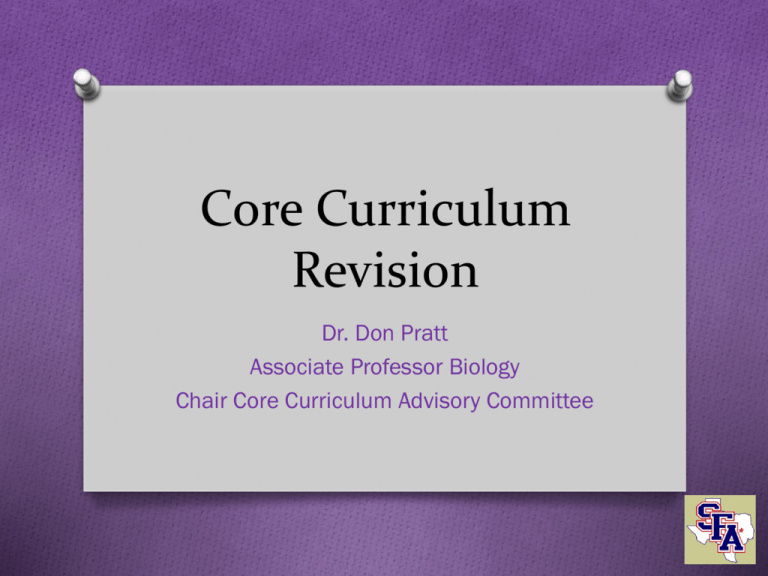
Core Curriculum Revision Dr. Don Pratt Associate Professor Biology Chair Core Curriculum Advisory Committee Presentation Objectives O Provide a history of the Core and Core revision process O Discuss new Core Objectives O Identify some unresolved issues O Present the Core Application Process History Current Core O Established in 1997 O 42-46 SCH O 37 EEOs O Why change the core? O THECB wants the core to help students build real world skills and capabilities Philosophical Shift Old Core O Accumulate credits O Across a wide academic background O EEOs were unique to a discipline New Core O Master six key skills O In a variety of academic disciplines O Core objectives are shared across the institution Purposes of the Core O Students will gain O Knowledge of human cultures and physical and natural world O Principles of personal and social responsibility O Intellectual and practical skills Workforce Report O Interviewed O 400+ employers O Expectations and experiences with O High School Graduates O Jr College Graduates O University Graduates Workforce Report Skills O Basic Knowledge O Applied Skills O English O Critical Thinking O Reading/writing O Communication O Math O Quantitative O Science Reasoning O Teamwork O Personal and Social Responsibility O Art O Social Studies Core Objectives Foundational Areas Communication Math Nat. Sci. Language, Philosophy, Culture Creative Arts Am. History Government Social & Behavioral Sci. CAO Crit. Think Comm Empir. Quant. Team Soc. Resp. Pers. Resp. Current 42-46 Revised 42 Communication 12-14 Communication 6 Math Science 3 6-8 Math 3 Science 6 Humanities 3 Language/Philosophy/C ulture 3 Fine Arts 3 Fine Arts 3 US History 6 US History 6 Government 6 Government 6 Social Science 3 Social Science 3 Institutional Option EEOs 0 37 Component Area Option Core Objectives 6 6 Core Objectives Critical Thinking O Includes O Creative thinking and innovation O Inquiry O Analysis, evaluation, and synthesis of information O Addressed in ALL core courses Communication O Effective development, interpretation, and expression of ideas O Includes O Written communication O Oral communication O Visual communication O Addressed in ALL core courses Empirical and Quantitative O Includes O Manipulation and analysis of numerical data or observable facts O Create informed conclusions O Addressed in Math, Science, and Social sciences Teamwork O Includes O Ability to consider different points of view O Ability to work with others towards a shared goal O Addressed in Communication, Sciences, and Fine Arts Personal Responsibility O Ability to connect personal choices, actions, and consequences to ethical decision making O Addressed in Communication, Language/Philosophy/Culture, History, Government Social Responsibility O Includes O Intercultural competence O Civic responsibility O Ability to engage in regional, national, and global communities O Addressed in Language/Philosophy/Culture, Fine Arts, History, Government, Social Sciences Unresolved Difficulties The Issues 1. How to handle four credit hour courses O Science courses O Foreign Language courses 2. How to allocate the Component Area Option Four SCH Dilemma O New core allocates O 6 hours to sciences O 3 hours to Language, culture, and philosophy O But O Science and foreign language courses are 4 SCH Option 1 O Account for extra hours at the degree level O Science O Six hours count towards core O Two hours accounted for in each degree O The Math O Current Core ranges from 42-46 SCH O New Core 42 SCH Option 2 O Account for extra science hours using credits from the Component Area Option O Leaves four hours O Decreases flexibility in how we use the CAO Component Area Option O 6 SCH to be applied by the University O Common opinions so far O Fourth Science hour O Communication O Ethics O Address student weaknesses ETS Data O Compares performance of Freshman and Senior students O SFA Students O Weak in O Critical Thinking O Reading O Writing O VERY weak in O Math Core Application Process Stages 1. Submit application to the Core Curriculum Advisory Committee 2. Submit assessment documents to Assessment Committee 3. Submit course changes to Undergraduate Curriculum Committee Timeline O Feb. 15, 2013- Application to Core O Fall 2013- Course changes to Undergraduate Curriculum Committee O Oct. 1, 2013- Core documentation, justification, assessment due to Provost O Nov. 30, 2013- Core documentation, justification, assessment due to THECB O Fall 2014- Begin new core
